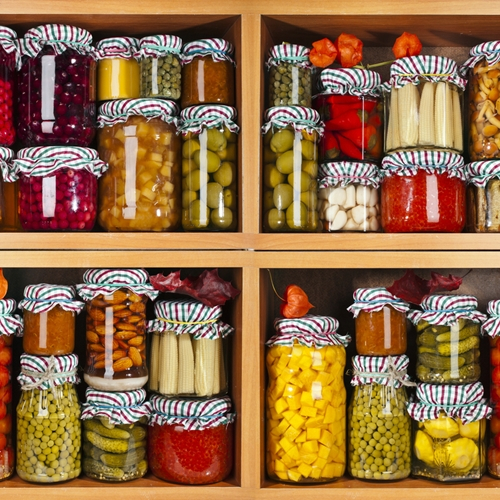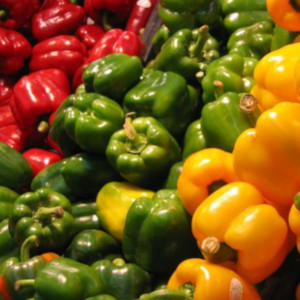That’s what my paternal grandmother always used to say, when she saved Egg shells to start seedlings in for next year’s Vegetable garden or spread Coffee grounds over her garden as fertilizer. My mom and dad both used the phrase frequently when I was growing up. No wonder I use it, too!
 You can Pickle almost anything in any size jar – but Soft Veggies
You can Pickle almost anything in any size jar – but Soft Veggies
such as Peppers work best in my Recycled Pickle
Juice cold process / refrigerator recipe…
My parents and grandparents went through the Great Depression, and learned to make fullest use of, or to reuse, everything they could. My dad used to collect string, back when string was used to tie up paper packages at the Meat market. He’d tie the short pieces together and use the stuff again And he never bought string until after plastic wrap and plastic trays took over at the Meat counter. Mother composted all the kitchen waste and was rewarded with rich, free fertilizer for her gardening and potting needs.
In that spirit, I also look for things I can reuse or recycle right here at home. It started with glass jars. I Decided to start keeping the Mason jars that certain Pasta Sauce brands came in, because they were just the right size for Herbs and Spices.
“You buy Pasta sauces?” I hear you saying. “But you’re a Chef!” Yes, I am, but sometimes I have to put together a meal on short notice and there’s no time to simmer Sauce properly. Or I get a special request. I always have a couple of jars of good quality Sauce in the cupboard as a backstop for those occasions. And I also have a cupboard full of identical 500 ml jars with self-sealing, air-tight lids in which to store my flavourings collection.
But the epitome of reusing and recycling is taking some food item that would otherwise be thrown away, and employing it in some new dish or project. That’s how I came to research Pickle Juice and Pickling methods.
Couldn’t be easier
As a Chef and sometime caterer, I buy Pickles, Olives, Hot Peppers and other items in large, 100 oz. / 3 L jars. I hated to see the Pickle Juice and Olive Brine go down the drain when the Veggies were gone, so I decided to try making my own simple Pickles re-using those precious fluids.
If you look closely, you’ll see that Pickle Juice usually contains a blend of whole Spices and Herbs, which impart their flavours to the product during maturation. They’re still good for another go-round after all the original Pickles are consumed. But I also taste the Juice to see if the flavours need fortification before adding fresh Veggies. I usually add a couple of crushed cloves of Garlic and a couple of tablespoons of fresh Salt. The Vinegar usually remains strong enough that I don’t need to add more. But do add more Salt or Vinegar if you wish, to ensure the brine is strong enough to keep the Veggies from spoiling.
My ‘recipe’ for a big jar of ‘ad hoc’ Pickled Peppers
I wait until Sweet Peppers are on sale at the supermarket, or are in high season at the local Veggie stands around harvest time. Then I grab two each of Red, Yellow and Green Peppers especially for Pickling.
As soon as I get home, I wash the Peppers thoroughly – especially the part where the stem connects to be sure there’s no dirt or other residues on them. Then I break them down the fast and easy way: Off with their tops and bottoms, run a knife blade round the inside of the Pepper ring separating the ribs and cores from the flesh, and then slice the cleaned Peppers from top to bottom into long, 1/2 in. / 1.25 cm wide strips. These go directly into the pickle jar, which will start out about 1/3 full of Pickle Juice. The 6 mixed Peppers I’ve prepared should just fill the jar with room for the Juice to circulate around the Veggies.
Place the jar in the bottom of your fridge for at least a month before you taste the Peppers. If at that time they taste good to you, go ahead and use them. If you want more flavour, just wait. They’ll get stronger and tangier as time goes by.
But don’t I have to cook the Veggies?
No. You bring the Pickling liquid to the boil the first time, when you make it, to help dissolve the Sugar and Salt, and meld the Vinegar and other flavours into an aromatic, united whole. Reusing the Pickle Juice, you don’t have to bring it to a boil again, because you’re not going to store your pickles at room temperature on a pantry shelf. They’re refrigerator Pickles, and the low temperatures, plus the high Salt and Vinegar concentrations in the Brine will ensure that they don’t spoil. Also – and this is especially true with soft Veggies such as Peppers – you don’t want your Pickles to come out mushy and slimy. Cold processing may take longer than the traditional method associated with firmer Veggies such as Cucumbers, but it keeps the Peppers crispy and helps them retain their beautiful bright colours.
Use your Recycled Pickle Juice cold process / refrigerator Pickles within 3 months. Always keep refrigerated.
Now that I have them, what do I do with them?
There are lots of ways to use Pickled Sweet Peppers, and I’m going to share one of my favourite dishes that spotlights them in its own post in the very near future…
~ Maggie J.

